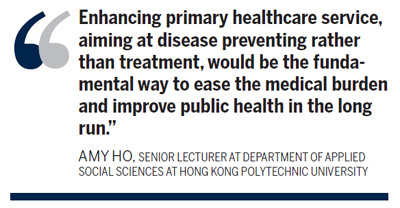Medical experts want more focus on prevention
Updated: 2011-02-22 07:03
By Michelle Fei(HK Edition)
|
|||||||

Medical experts have predicted recurrent expenditures on healthcare to increase HK$2 billion in the year ahead, climbing to around HK$39 billion by 2012.
The expectations for Financial Secretary John Tsang Chun-wah's budget to come out Wednesday are predicated on Chief Executive Donald Tsang's 2010-11 Policy Address.
The chief executive has pledged to increase public health expenditures from 16.1 percent to 17 percent of the government's recurrent expenditure by 2012.
Experts expect the percentage to reach 20 percent, as a step toward improving healthcare services.
Healthcare experts however argue that given the aging population, the system would achieve greater benefit if the additional funds were directed to the primary healthcare field, into public education, prevention and medical screenings.
Past practice has seen the government focus on facilities and the public healthcare system in general.
"The gap between the city's public healthcare demand and its insufficient capacity has loomed larger and larger in recent years as a result of the aging problem," said Tim Pang Huang-cheong, community organizer of the Society for Community Organization, citing the growing population of people with chronic illness.
He urged greater resources be invested in prevention.
Pang also suggested that the government raise medical funding to better serve the public.
"Enhancing primary healthcare service, aiming at disease prevention rather than treatment, would be the fundamental way to ease the medical burden and improve public health in the long run," said Amy Ho, senior lecturer at the Department of Applied Social Sciences at the Hong Kong Polytechnic University.
"The city has been leaning too much on the public healthcare system for a long time," said Ho, citing that of the estimated HK$2 billion increase in the healthcare budget, 80 to 90 percent may be expected to go to the Hospital Authority to improve service at public hospitals, leaving insufficient resources for the Department of Health on primary healthcare.
On the other hand, the city's most commonly occurring chronic illness, such as diabetes and hypertension, are all caused by unhealthy eating habits or lack of exercise, which could be prevented or corrected through public education, Ho said.
Dr Choi Kin, president of the Hong Kong Medical Association suggests the authority introduce a part-time work system for female doctors, whose numbers are vastly greater than those of male doctors but they also require more time off work to take care of families.
He said a part-time system would improve doctors' efficiency and raise morale.
Experts also predicted the implementation period for the Elderly Health Care Voucher system will be extended for another three years from December 2011 to 2014. The vouchers are expected to increase from the current HK$250 to at least HK$1,000, with the age limitation being lowered from 70 to 60.
China Daily
(HK Edition 02/22/2011 page1)